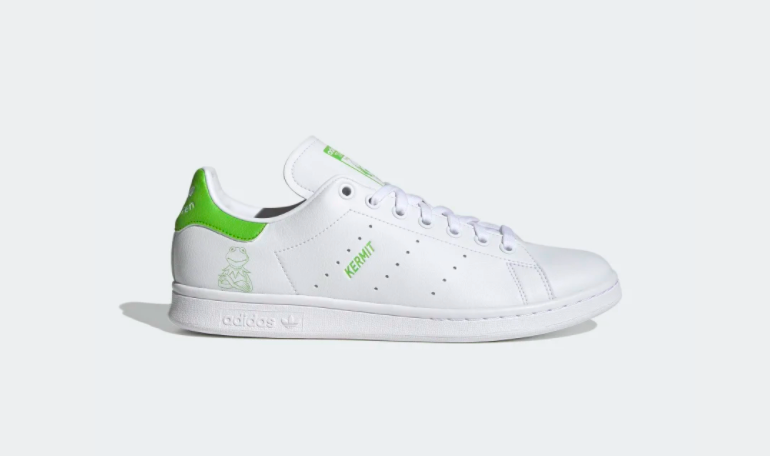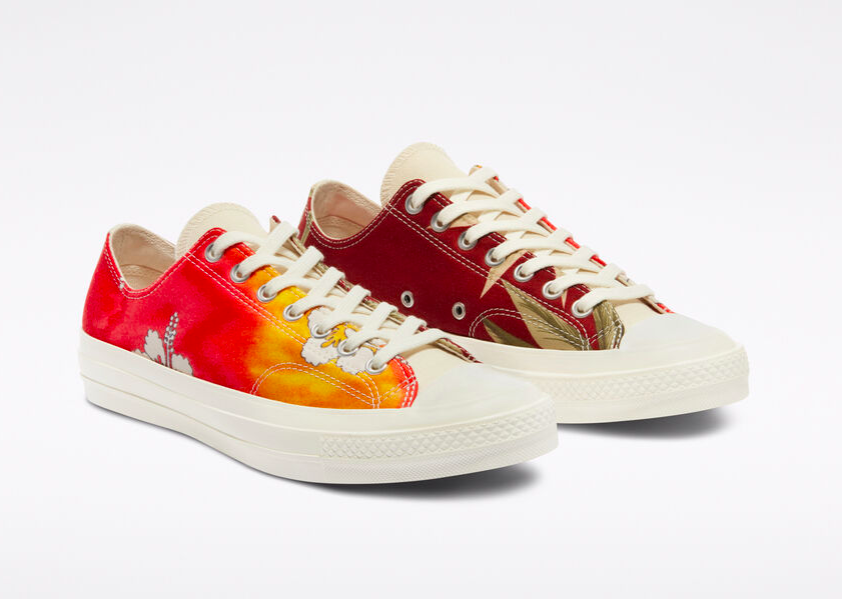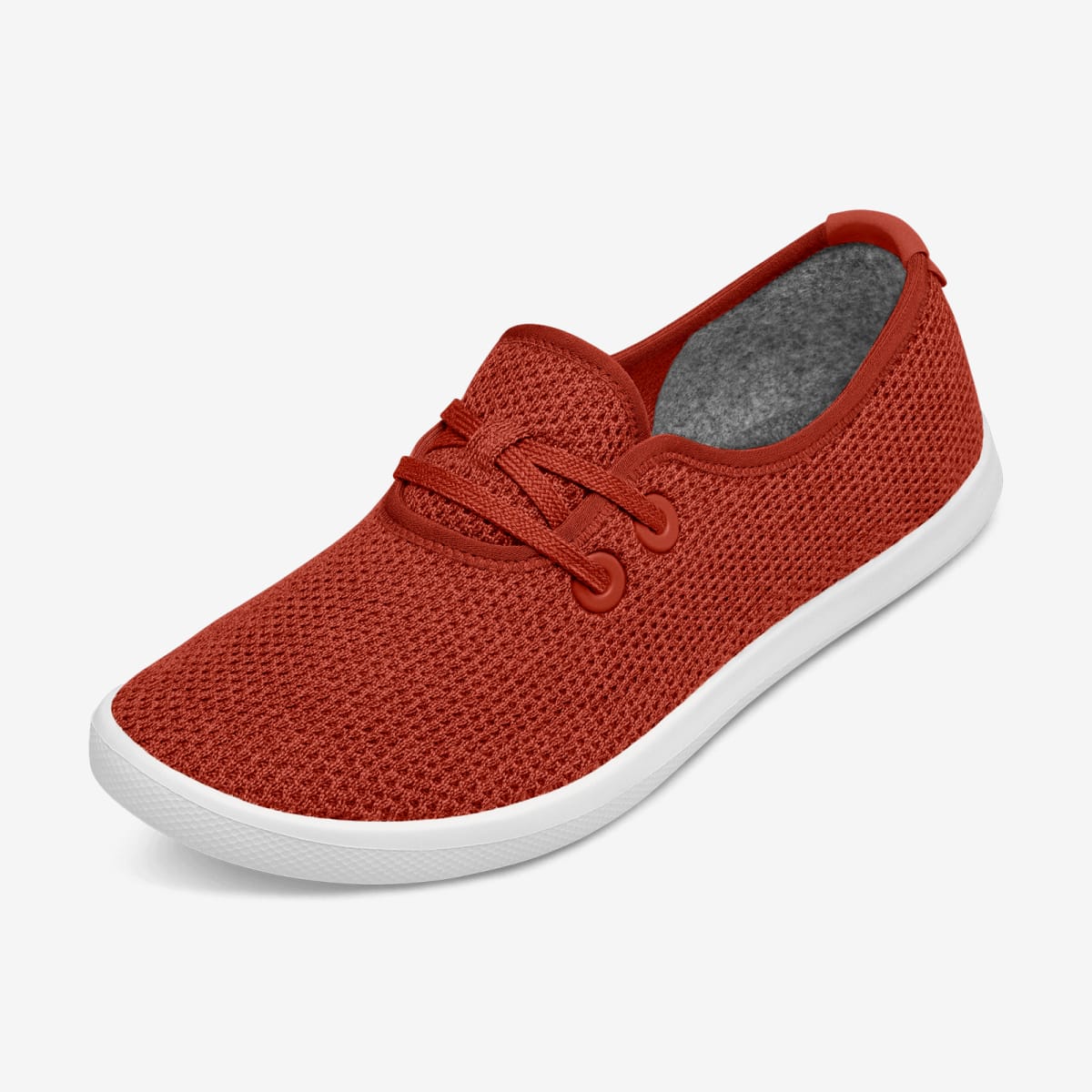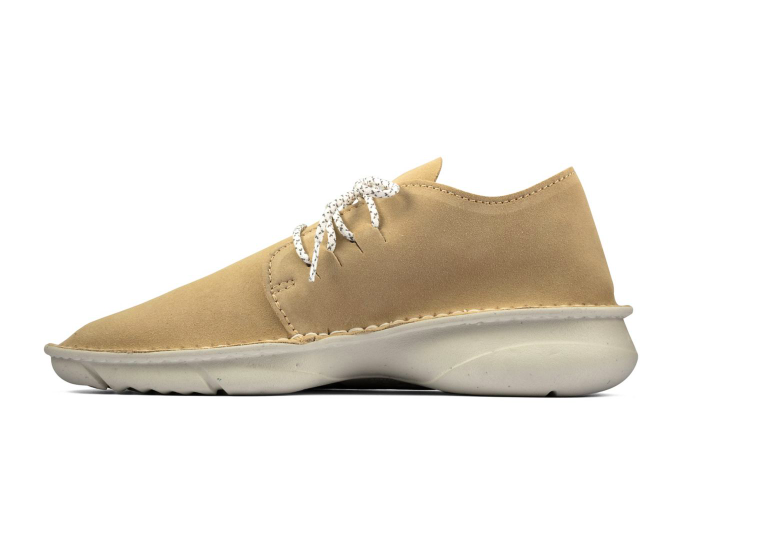
Most shoes have about seven parts, but add other elements for design appeal and function, and those parts can add up to a few dozen. Hence one problem fashion brands struggle with as they try to roll out more sustainable shoes: Between an entangled supply chain and dodgy materials that have long been a part of shoe design, responsible manufacturing is a challenge. Of course, there are the materials themselves, many of which are plastic.
Some brands are cracking that nut, however, and are rolling out responsible and sustainable shoes that both look great and have less of an impact on the environment.
Adidas: Kermit the Frog hooks up with Stan Smith
The minimalist Stan Smith has been around for half a century and was a fixture in many a teen’s wardrobe during the 1980s. These classic tennis shoes are still able to stay relevant. For one of the shoe’s latest editions, Adidas introduced a Kermit the Frog line — perfect for the tween or the adulting type who seeks a podiatric nod to the sustainability movement. The best thing about these Stan Smiths? The uppers are made from a material that includes 50 percent recycled content. Like Kermit said while dodging Miss Piggy, it’s not easy being green, but these are a start.

Aloha, Converse
To paraphrase Dame Edna, “If it looks good in Hawaiʻi, it stays in Hawaiʻi.” Some may disagree how kawaii the islands’ trademark shirts (the truth is many are stellar and are more chic rather than screaming a mainlander going full muumuu), it’s a safe assumption to think thousands, if not millions, are hanging and hidden in many a closet.
Converse says it has a solution. According to an emailed announcement the company sent around last month, its designers nabbed about 7,000 shirts and are churning them into a limited-edition version of the iconic Chuck 70s. If the company’s plans go without interruption, the shoes will be available starting today.
In addition, Converse says it will also release sneakers made in part from those pesky Tyvek mailers, as well as hi-tops dyed with more sustainable materials; another product line with an upper that is made from 85 percent recycled materials is also in the works.

Sustainble shoes leader Allbirds sees the forest from the trees
Depending on one’s point of view, the eucalyptus tree, which originally hails from Australia, provides spectacular scenery and its scent evokes an indulgent spa day. To others (especially in California), it’s more of a giant weed that is a fire hazard, or during heavy rains inspires too many love letters to home insurers for whom their properties may unfortunately may have been plunked in these trees' gargantuan path.
Allbirds has found a use for the mercurial eucalyptus: It’s the base of what the company says makes for a smart pair of sustainable shoes. Rather than using cotton, the shoes’ uppers are made from eucalyptus fiber, which makes for an airy, breathable, easy-to-care-for pair of shoes that are yes, a more responsible option.

Clarks goes back to its origins
It’s highly improbable Clarks inspired the Proclaimers’ song “I Would Walk 500 Miles” — after all, the tune was featured in the 1993 movie Benny and Joon — but serious walkers have long been very serious, if not ebullient, about Clarks. TriplePundit tried out a pair of the new Origin sneakers, and in addition to the fact they pair well with seersucker shorts, they are amazingly lightweight. The outsole is made from 51 percent recycled content, and here’s what really makes the Origin a winning pair of sustainable shoes: They are made out of only five parts including the laces, and no glue is used in their construction.
Will they last as long as 3p’s other pair of Clarks, which were scored during a 2008 biz trip to D.C.? Check in with us in 2034 — the older pair is proving to be fairly indestructible. If durability defines sustainable shoes, then the more ancient pair has already passed the test.

Vans: Black Lives Matter
The social side of sustainability is just as important as the environmental side — perhaps even more, as it is clear many marginalized communities have been overlooked by the sustainability movement. We’ve profiled this line of shoes from Vans and have no hesitation about showcasing them again. As part of these shoes' backstories, one of the series' featured artists, Chris Martins, discussed the impact of racism on the Black experience in America.
“My Blackness is completely inseparable from all aspects of my life. The ideology and bigotry of American history shaped the consciousness of all souls inhabiting Black bodies. Through my work I’m able to hold a mirror to this dark experience and share perspective, inform, and gain the attention of anyone willing to take part in the uneasy American truth,” Martins wrote earlier this year.
Cover image credits: Leon Kaye

Leon Kaye has written for 3p since 2010 and become executive editor in 2018. His previous work includes writing for the Guardian as well as other online and print publications. In addition, he's worked in sales executive roles within technology and financial research companies, as well as for a public relations firm, for which he consulted with one of the globe’s leading sustainability initiatives. Currently living in Central California, he’s traveled to 70-plus countries and has lived and worked in South Korea, the United Arab Emirates and Uruguay.
Leon’s an alum of Fresno State, the University of Maryland, Baltimore County and the University of Southern California's Marshall Business School. He enjoys traveling abroad as well as exploring California’s Central Coast and the Sierra Nevadas.














